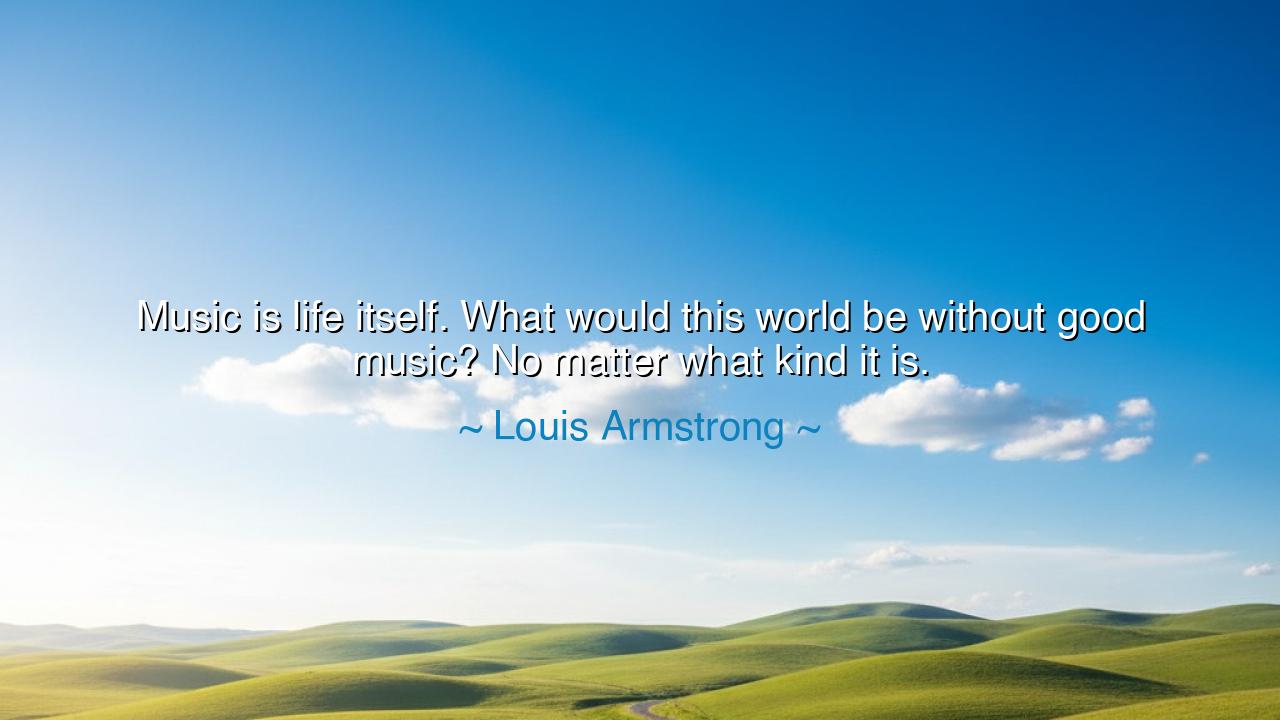
Music is life itself. What would this world be without good
Music is life itself. What would this world be without good music? No matter what kind it is.






Louis Armstrong, a prophet of melody, once declared: “Music is life itself. What would this world be without good music? No matter what kind it is.” These words, though simple in form, carry the weight of eternal truth. For just as breath sustains the body, so does music sustain the soul. It is not merely sound in the air, nor entertainment for idle hours—it is the pulse of existence, the invisible thread that binds human hearts across time, nations, and generations. To live without music would be to live without color, without rhythm, without the very language of the spirit.
The ancients themselves knew this truth. Pythagoras spoke of the “music of the spheres,” believing that the planets moved in harmony, their orbits singing a divine song inaudible to human ears. The Hebrews played harps and lyres to soothe the soul, and the Greeks wove entire dramas upon the foundation of chorus and song. Even the earliest tribes, gathered around firelight, beat drums and lifted voices to the sky, for they knew instinctively that music is not ornament, but essence. Armstrong’s declaration is thus no modern invention—it is the echo of a truth as old as humanity itself.
And what would the world be without music? Imagine it: no lullabies to calm a child, no anthems to rally armies, no hymns to carry prayers upward, no songs to bind lovers in memory. The silence would not be peace but desolation. For when grief strikes, it is music that gives the sorrow shape. When joy bursts forth, it is music that gives it wings. Without it, the human heart would be a bird with broken feathers, unable to rise. Armstrong reminds us that whether in jazz, symphony, folk song, or chant, the form matters not—the essence is the same. All music, when true, is a reflection of life.
Consider the story of Armstrong himself. Born in poverty, he rose from hardship by the trumpet in his hand and the song in his heart. When the world looked upon him with disdain, his music made them listen, and in listening, they were changed. He did not merely play notes; he gave the breath of his own life to every sound, so much so that audiences across the earth felt their spirits lifted. His music transcended barriers of race, class, and nation, reminding all who heard it that life—in its sorrow and its joy—is shared. Truly, in him, the words became flesh: music is life itself.
But this truth is not reserved for Armstrong alone. Think of Beethoven, who, though deaf, composed symphonies that thunder with vitality. His silence in the ear could not silence the music of his soul, for within him life burned too brightly to be muted. Or think of the enslaved who sang spirituals in the fields—songs of suffering, yet also of hope, songs that gave strength when chains weighed heavy. Their music was their life, a reminder that though their bodies were bound, their spirits soared free.
What lesson then must we learn? That to honor music is to honor life itself. It is not a luxury, but a necessity; not a pastime, but a pathway to meaning. To neglect music is to neglect part of our very humanity. And to embrace it is to drink from a fountain that refreshes both body and spirit. Armstrong’s words are both declaration and command: seek music, cherish it, let it move through you, for in doing so you touch the eternal rhythm of existence.
Practical wisdom follows: make space for music in your days. Do not listen passively, as if it were background noise, but listen as if it were a conversation with your own soul. Sing, even if your voice trembles. Play, even if your hands falter. Support those who carry the torch of music, for they keep alive the flame that lights the human spirit. And most of all, let music teach you to live—with depth, with feeling, with truth.
Thus remember Armstrong’s words: “Music is life itself.” Carry them as a reminder that in every melody lies a reflection of who we are and who we might yet become. When you are lost, let music guide you. When you rejoice, let music celebrate with you. And when you pass into silence at the end of days, let music carry your memory onward, for though life ends, music never dies.






AAdministratorAdministrator
Welcome, honored guests. Please leave a comment, we will respond soon